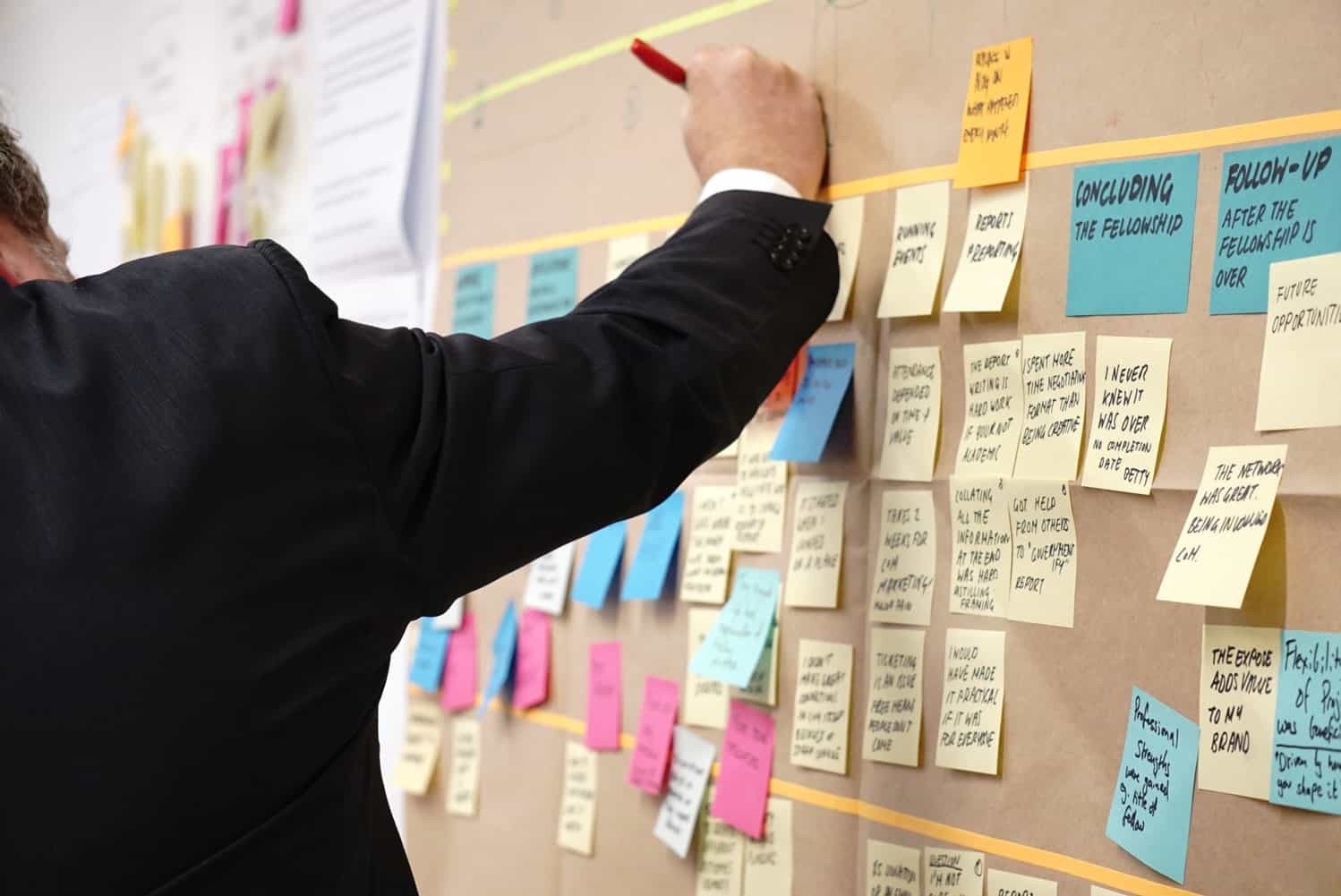Ever since our co-founder, Debbie Roberts, was a teenager, she had a vision board.
What is that?
A vision board is a tool to help clarify, concentrate and maintain focus on specific life and business goals that represent whatever you want to be, do or have in your life.
Why is it important?
By keeping the vision board in plain view daily, it’s a great reminder of what goals you’re pursuing and gives you motivation to do the actions that will enable you to achieve them.
You might be thinking, “I don’t believe in vision boards and that new age stuff” or “It’s too hokey for me.”
Well, as the leader of your bookkeeping business, it’s your job to create a vision for your operation.
So, why not have a vision board to reinforce daily what that dream is and inspire you to accomplish it?
As you know, it’s important to have a vision for your business. You’ll need one that’s large enough to withstand the obstacles that will inevitably come your way as you grow your operation.
Remember, a powerful vision isn’t just about money. It really is about how you feel.
For example, what would it feel like when you’re turning over $500,000, have 10 bookkeepers working for you, no longer doing the bookkeeping yourself and have a terrific Operations Manager who looks after the day-to-day running of your business?
Imagine having the flexibility to do other things you enjoy including spending more time with your kids and travelling around the world.
If I’ve peaked your interest, you’re probably now thinking, “Okay, sounds interesting. How do I create my own vision board?”
Well, here are some tips, courtesy Jean Van’t Hul of ArtfulParent.com, to get you started.
First, these are the materials you’ll need:
Poster board
Magazines
Other images and text from artwork, old books, computer printouts, etc. (optional)
Scissors
Glue sticks
Paper and pen
Sharpies or other permanent markers (optional)
Now, let's create your vision board.
The upcoming instructions are general in nature, so feel free to take what works best for you and develop your own way of doing things.
10 Steps To Creating A Powerful Vision Board
1. Set goals and prioritize
Sit down with paper and pen and think about your goals for the coming year. This initial step is your big brain dump and includes the big goals (get healthy and strong, learn how to create a 6-figure bookkeeping business, take the family on a trip to Disney World, etc) to the little wishlist type of stuff (get a new IPhone), intentions (be more mindful, connect with my family better) and words for the year (clarity, joy, peace).
After you do the first brain dump, review your thoughts and notes and figure out what your priorities are and either circle them or create a new list.
What are the things you really, really want to happen above all else?
Those are definitely going on your vision board. A lot of the other things will end up on your board, too, but you want to make sure the biggies get their place.
2. Create a basic structure on my poster board
This step is optional, but if you choose to do this, divide the poster board into a nine section bagua by drawing two equidistant vertical and horizontal lines then title each section with the life area that it corresponds within the bagua.
The bagua is a key component of feng shui, but even if you don’t believe in feng shui, it provides a nice framework and some general life categories to keep your goals and vision board well rounded.
Again, it’s optional, so feel free to organize your vision board the way you’d like.
Each section has a corresponding life area associated with it as well as a colour. You can consider both when creating your vision board.
3. Write goals and ideas on my poster board
So, once you draw the bagua on your poster board and write both the life area and colour on it then start writing your goals and intentions for each area directly on the poster board. This will later get covered over with collage images, so don’t worry about how it looks or if you’re just thinking on paper and later change your mind about some of your priorities or whatever.
This part will help you to round out your goals. For example, if your initial brain dump focuses on finances and health, you are now reminded to consider relationships, skills, etc.
In addition, this part will help you to focus in the next step when you’re searching for images.
4. Find images and words for the vision board
Search for and cut out images and words that embody your goals and/or just speak to you. Go through a stack of magazines and clip everything you like—colours, words and interesting images.
5. Sort and arrange the images and words
You could do this as you go or after the cutting spree. So, with your poster board in front of you and your pile of images at hand, go through the images and decide what belongs on the poster board and place it roughly in the section it will go.
Continue through the pile of clippings.
Some images will go on the poster board, some will go in a “later” pile to be used in a future collage or just recycled.
6. Edit and create your collage
Now, it’s time to narrow down further both the images and words and the placement. Time to cut around the flowers or bicycle or whatever, if you haven’t already. Trim and refine.
7. Glue down your images
While doing this step, if you like, you can begin with a base layer of colour and themes then build on with the smaller images, but it’s not necessary.
8. Add your own words, doodles or sketches
You can place them over and around the collaged images with Sharpie markers (optional).
9. Display!
Hang your new vision board on the wall where you will see it daily. The act of creating it is important, but so is seeing it regularly.
If you’re really feel proud of your creation, you can have it laminated at Staples.
10. Review daily
So, you have your new vision board in a place where you can see it every day, right? Make sure to pause and review the images, messages and goals at least once a day.
Start taking a few minutes each morning to revisit the goals that the images and words represent, to imagine what it will be like when they are reality and to think about something you could do that day toward each goal.
If you’re wondering what types of vision boards you can create, here are some options:
Poster - Glue images to a piece of poster board (as in the process above)
A portable vision board as an accordion fold book
Goal-specific vision boards - Specifically for one goal (getting my first bookkeeping client, etc) or for one area of your life (health)
Cork board or bulletin board - Use pushpins to attach images and words to a bulletin board
Inspiration wall - Pin or tape images and words to a wall
String + clothespins
Small vision boards in planner - Make or include small vision boards within/on your calendar or planner
Art journal as a vision board
SoulCollage Cards
Pinterest board as a vision board
Thank you Jean for the tips.
So, what will be on your vision board?
To your success,
Michael

Article by Michael Palmer
Michael is the CEO of Pure Bookkeeping, the host of The Successful Bookkeeper podcast and an acclaimed business coach who has helped hundreds of bookkeepers across the world push through their fears and exponentially grow their businesses and achieve the quality of life they've always wanted.
Subscribe Now
Recent Posts
- AI in Bookkeeping: Trends to Watch in 2025
- Understanding the New Quality Management Systems Law and Its Impact on Bookkeeping Businesses
- What’s Your Biggest Financial Goal for 2025?
- Spring Into Organisation: How to Clean Up Your Books for a Stress-Free Financial Year
- How To Stand Out From Your Bookkeeping Competition




